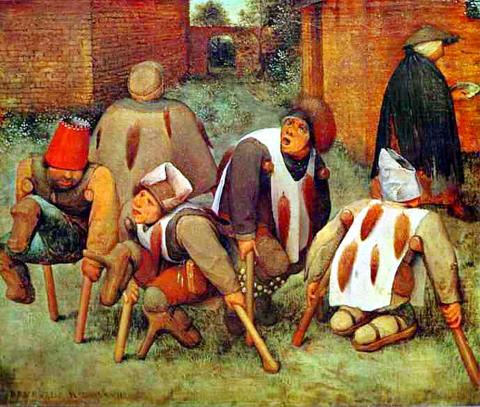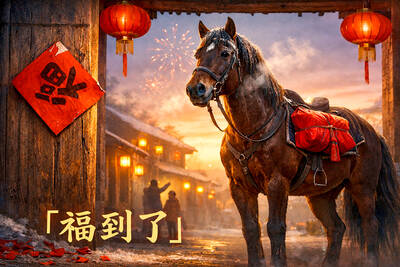Chinese Practice
飢不擇食
(ji1 bu4 ze2 shi2)

Photo: Wikimedia Commons
照片:維基共享資源
when hungry, you can’t pick what you eat
孟子(約西元前三七二~西元前二八九年)是戰國時期儒學家,周遊列國,向各諸侯提出治國的建言。孟子的基本主張是,統治者應該以仁義治國,如此人民便自然而然會擁戴他們。
在《孟子.公孫丑上》中,公孫丑問孟子說,如果孟子有機會掌治理齊國的大權,那是否有機會建立像管仲、晏嬰等賢人古時為齊國所成就的霸業?孟子回答說,雖然統治者長期以來的作為遠不及古代先賢的仁政和德政,但跟這些賢人統治下的齊國相比,孟子時代的齊國有兩點更具優勢:它有更廣闊的領土和更多的財富,以及人民對仁政和德政的渴望,因為人民長期以來一直缺乏這種開明的統治。孟子說:「飢餓易為食,渴望易為飲」,意為「飢腸轆轆的人可以吃下任何東西,口渴的人可以喝下任何東西」。這句話的前半部演變為成語「飢不擇食」,字面意思是「飢餓得不去選擇所吃的食物」。成語「飢不擇食」是用來表達,在艱難或困乏的時候,我們沒有那種奢侈去等待最佳選項出現。
「飢不擇食」這個成語後來出現在施耐庵(約西元一二九六~一三七二年)的《水滸傳》──一般公認為是中國文學四大古典小說之一,其中有一句寫道:「自古有幾般:飢不擇食,寒不擇衣,惶不擇路,貧不擇妻」(自古就有一定的道理:飢餓時不能選擇吃什麼,寒冷時不能選擇穿什麼,情急時不能選擇要走的路,貧窮時不能選擇要娶的妻子)。
英文有一句諺語「beggars can’t be choosers」(乞丐不能當做出選擇的人,或乞丐沒得挑),與「飢不擇食」有明顯的相似處。我們已知這諺語至少有數個世紀的歷史,因其出現在英格蘭作家約翰‧海伍德(約一四九七~一五八○年)的作品中。
海伍德在一五四六年的《英文諺語全集》──我們在先前的「活用成語」單元曾提到過幾次,往後也必會再出現──他寫道:
不,正如常言道,無論是贏家還是輸家
乞丐都沒得挑。
所以如果我阿姨願意給我這個,我會接受;
因為當你什麼都沒有的時候,即使是一點小東西都不無小補
海伍德在另一部作品《三百諺語的三百警句》(此書與前述《英文諺語全集》皆收錄於一五六二年的彙編《約翰‧海伍德之諺語、箴言和雜記》)中,他寫道:
人說乞丐不會是做選擇的人;但他們會選擇去乞討
誰能阻止乞丐去乞討呢?
(台北時報林俐凱譯)
他失業太久了,因為找工作屢屢碰壁,現在飢不擇食,什麼都願意做。
(He’s been unemployed so long, and keeps hitting a wall in his job search. Right now he’s thinking beggars can’t be choosers: he’d be willing to do anything.)
他好不容易回到家,也不管麵包發了霉,便狼吞虎嚥起來,真是飢不擇食。
(At long last he got home, and wolfed the bread down, even though it was moldy: He was desperate for something to eat.)
英文練習
beggars can’t be choosers
Mencius (ca 372–289 BC) was a Warring States period Chinese philosopher in the mold of Confucius (551–479 BC), traveling around offering advice to rulers of states. Mencius’ basic stance was that a ruler should lead by benevolent and just governance, and if they did this, the people would naturally follow them.
In the Gong Sun Chou I chapter of the mengzi (Mencius), he was asked by Gong Sun Chou about whether the state of Qi stood a chance of gaining supremacy over rival states, and achieving what statesmen Guan Zhong and Yanzi had done for the state in the past. Mencius answered that, although contemporary rulers had long fallen short of the standards of benevolence and virtue of the ancient sages, Qi benefitted from two things compared to those sages’ kingdoms: not just more expansive territory and greater wealth, but also the sheer willingness of the people to follow a benevolent, just ruler, as they had been starved of such enlightened rule for so long. According to the Mencius, he said 飢者易為食,渴者易為飲: “The hungry readily partake of any food, and the thirsty of any drink.” The first part of that sentence has come down to us as the idiom 飢不擇食, literally “the starving do not choose their food.” It is used to express the idea that, in trying times, or in times of want, we do not have the luxury of waiting for the best option to come.
The idiom appeared in Shi Nai’an’s (ca. 1296–1372) shuihu zhuan (Water Margin) — widely regarded as one of the Four Great Classical Novels of Chinese literature — in the sentence 自古有幾般:飢不擇食,寒不擇衣,惶不擇路,貧不擇妻 (“From ancient times there have been certain truths: the starving cannot choose what they eat, the cold what they wear, the desperate the road they tread, nor the poor the wife they take”).
In English, we have the proverb “beggars can’t be choosers,” with the obvious similarities with 飢不擇食. We know this proverb to be at least several centuries old, as it appears in the works of the English writer John Heywood (c. 1497 – c. 1580).
In his 1546 collection A dialogue conteinyng the nomber in effect of all the prouerbes in the Englishe tongue — which we have mentioned on several occasions before in Using Idioms, and which we will no doubt have occasion to use again — Heywood writes:
Nay, (quoth I), be they winners or losers,
Folk say alway beggars should be no choosers.
With thanks, I shall take whatever mine aunt please;
Where nothing is, a little thing doth ease.
In another work, Three Hundred Epigrams upon Three Hundred Proverbs — appearing together with the aforementioned collection of proverbs in a 1562 compilation entitled The Proverbs, Epigrams and Miscellanies of John Heywood — he writes:
Beggars should be no choosers; but yet they will;
Who can bring a beggar from choice to beg still?
(Paul Cooper, Taipei Times)
This model has more functions, but we should get the cheaper one. Beggars can’t be choosers.
(這個型號的功能比較多,可是我們應該買便宜一點的。我們預算有限,沒辦法挑三揀四的。)
The chef has gone home. We’ll have to make do with a sandwich. Beggars can’t be choosers.
(廚師下班了,所以只有三明治可以吃,我們沒得挑。)

Bilingual Story is a fictionalized account. 雙語故事部分內容純屬虛構。 Just yesterday, the boy had helped hang the lucky red couplets. Tonight, as firecrackers signaled the New Year, he lay in bed burning with a surging fever. The herbalist checked the boy’s pulse and went still. “The only cure is in the county town across the mountains,” he said. “But the snow is deep, and the shops are shuttered until the Fourth Day.” The boy’s father looked at the window. “I will go.” “The roads are impassable for a cart,” the herbalist warned. “And too far for a man on foot.” The concerned neighbor

Many animals spend the winter in a deep, low-energy state known as “hibernation.” When food becomes scarce and cold conditions drain body heat, bats, hedgehogs, and some ground squirrels retreat to safe shelters. Their bodies slow down to save energy: heart rates drop, breathing becomes shallow, and body temperature falls. Plenty of preparation goes into hibernation. Shorter days and falling temperatures provoke these animals to eat more and store fat, which sustains the brain and other organs. Inside the body, hormones guide this seasonal change, triggering specific behavior and switching the system to energy-saving mode. Hibernation is not the only winter survival

1. 我沒有兄弟姊妹。 ˇ I have no brother(s) and sister(s). ˇ I don’t have any brothers or sisters. ˇ I have no siblings. χ I have not any brothers or sisters. 註:首句 no 是形容詞,加在名詞前作修飾用,意思等於 don’t have any。I have not any 是彆扭過時的講法,現代英文一般會說 I don’t have any... 或 I have no...。 又如:*In totalitarian countries people have not any freedom. 應改為 people have no freedom. 或 people do not have any freedom. 2 不要怕那隻狗。 ˇ Don’t be afraid of the dog. ˇ Don’t fear the dog. χ Don’t afraid of the dog. 註:afraid 是形容詞,在句中作補語,前面必須加 be 動詞。注意:「我不怕熱」,一般不說 *I’m not afraid of hot weather. 可以說:Hot weather doesn’t bother me. 3. 他準備好了嗎? ˇ Has he got everything

對話 Dialogue 清清:下個星期公司要辦尾牙,你會去參加嗎? Qīngqing: Xià gè xīngqī gōngsī yào bàn wěiyá, nǐ huì qù cānjiā ma? 華華:應該會吧。聽說今年會請大家吃一頓不錯的。 Huáhua: Yīnggāi huì ba. Tīng shuō jīnnián huì qǐng dàjiā chī yí dùn búcuò de. 清清:我第一次參加尾牙,有一點緊張,不知道要做什麼。 Qīngqing: Wǒ dì yī cì cānjiā wěiyá, yǒuyìdiǎn jǐnzhāng, bù zhīdào yào zuò shénme. 華華:不用擔心啦,尾牙主要就是吃飯、聊天,大家放鬆一下。 Huáhua: Búyòng dānxīn la, wěiyá zhǔyào jiù shì chīfàn, liáotiān, dàjiā fàngsōng yíxià. 清清:聽說尾牙還會抽獎,是真的嗎? Qīngqing: Tīng shuō wěiyá hái huì chōujiǎng, shì zhēn de ma? 華華:對啊,有些公司獎品還不錯,所以很多人都很期待。 Huáhua: Duì a, yǒuxiē gōngsī de jiǎngpǐn hái búcuò, suǒyǐ hěn duō rén dōu hěn qídài. 清清:那如果不去,會不會不太好? Qīngqing: Nà rúguǒ bú qù, huì bú huì bú tài hǎo? 華華:通常不會勉強,不過去參加比較有機會跟同事拉近關係。 Huáhua: Tōngcháng bú huì miǎnqiǎng, búguò qù cānjiā bǐjiào yǒu jīhuì gēn tóngshì